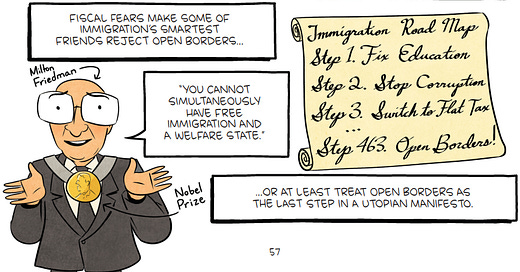One of Milton Friedman’s most famous lines: “You cannot simultaneously have free immigration and a welfare state.” He said it in a 1999 ISIL interview, and I’ve heard it quoted dozens of times. It even inspired me to write a Champions scenario, “The Law of Unintended Consequences.” (Want to play it? Email me for an invitation to Capla-Con, July 12&13!)
Actually, I think Friedman’s wrong. Yes, the U.S. welfare state pays more than most people on earth earn. But once immigrants arrive here, few of them want to settle for a welfare check; they want to earn some real money. In fact, once you realize that the welfare state is primarily about helping the old, not the poor, it turns out that immigration may be the only way for aging countries to sustain their welfare states.
But I digress. Right or wrong, Friedman’s claim about immigration and the welfare state is entirely in character for him. I was shocked, then, to read his response to a followup question in the ISIL interview:
Q: Instead of a green card [resident alien status], can the USA issue a blue card which does not give welfare?
A: If you could do that, that would be fine. But I don’t believe you can do that. It’s not only that it is not politically feasible, I don’t think that it is desirable to have two classes of citizens in a society. We want a free society. We want a society in which every individual is treated as an end in themselves. We don’t want a society in which some people are in there under blue conditions, others are in there under red conditions, others are in there under black conditions. We want a free society. So I don’t believe such ….
I haven’t really ever thought of that system. It’s a new question. I very rarely get a new question, but I must admit that’s a new question for me. And I haven’t really thought about it a great deal, but my initial reaction is that it’s a very undesirable proposal.
Granted that Friedman was 87 when he said this, it’s still appalling. Normally, Friedman was eager to embrace any marginal measure in the direction of liberty. But on immigration, he bizarrely turned his wish for a “free society” into an argument against a compelling libertarian improvement over the status quo. And how in the world does telling people, “You can’t come here because you might collect welfare” an example of treating people “as an end in themselves”?!
My last, best way to rescue my intellectual idol is his admission that he’d never thought about the proposal before. But isn’t that bizarre? Friedman, who could run mental circles around lesser geniuses, never asked himself, “What is the least un-libertarian way to deal with the conflict between free immigration and the welfare state?”? The lesson, perhaps, is that what Tim Harford calls “keyhole surgery” (looking for the least intrusive solution to market and/or political failure) is a major intellectual advance – obvious in retrospect, but deeply counter-intuitive nonetheless.
The post appeared first on Econlib.





"Granted that Friedman was 87 when he said this, it’s still appalling." Appalling? Come on Bryan, you may disagree with it, but let's not go hyperwoke on statements you disagree with. This is one of the reasons carrying on a rational, non-emotional debate has become so difficult nowadays.
I've heard other people make Friedman's argument before, and I don't think it's as cut and dry as you've said in this piece.
On paper it does seem like an improvement, but in practice it could end up creating social animus and discord that swamped the benefits out. It could create a sense of unfairness, because despite paying taxes you wouldn't be able to receive any benefits if you became unemployed, for example.
In practice I imagine the scenarios in which this would actually happen would be far fewer and lesser than the benefits gained by those who came and never needed the welfare system, but there is still the risk associated with the perception it could create. You may end up with a sort of caste-like system.
I still think it's better than not letting them come at all, but it is more nuanced than this piece suggests.